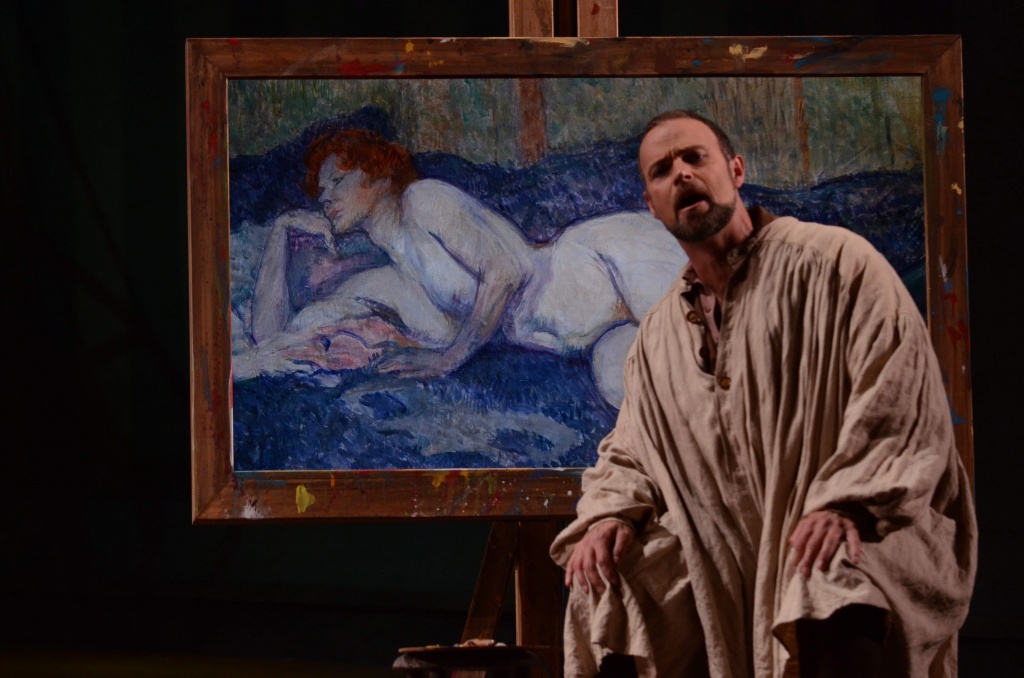Troy Cook, an out, Philly-area baritone with a warm piercing voice and a playful personal manner will appear (again) in La Bohème. Cook will play “Marcello” for this third time, only this time, soprano Ashley Marie Robillard will be his “Musetta.”
“I have loved each opportunity to play him, equally,” said Cook. “Every time, it just gets better.”
Cook moved through the “opera mecca of New York” after graduate school until deciding he was finished with the city that never sleeps. “I’m OK with New York, but I’m done,” said Cook. He settled in Bucks County, because it reminded him of his hometown, Louisville, KY, and it was close to both New York City and Philadelphia, “the principle towns” he works in. As he put it, “that makes life easy.”
As for how his identity has fit into opera and his life over the course of his career, Cook says, “Opera, as an industry, has always been open and friendly toward the gay community, and an opera as an art-form has always been part of the gay community. I know colleagues whose families were not very supportive when they came out, and they have been able to find their chosen family within the opera community. In my career I’ve not once felt like I couldn’t be myself.”
La bohème, Cook says, “is about a group of artists simply trying to figure out who they are. That speaks to the universality of this opera; gay or straight we are all just trying to navigate our way through this crazy thing we call life and hopefully by the end discover who we really are.”
While Opera Philadelphia has produced “La bohème” before, this time, the staging and costumes are what Cook calls, “art works that live and breathe in Philadelphia — the Barnes Foundation/Museum, and the Philadelphia Museum of Art.” Cook says that this is Philadelphia’s La bohème, one that engages art work that exists only here, and that can be seen out your back door. “This isn’t the Zefferelli La bohème of New York City,” says Cook. “This is uniquely Philadelphia.”
While Robillard states that her Mussett’s lush green costuming is pulled fresh from the frames of more than a few of Philadelphia’s Renoirs, Cook states that Marcello and his costuming is Monet influenced and magnificent. “Marcello” has never been a better painter in comparison,” he said with a laugh. “To be “Marcello” in this production is a particular delight.”
As for Cook keeping his Marcello fresh on stage, he says, “You feed off your colleagues in an ensemble, and whenever there is a new group of colleagues, it’s different,” adding, “You find something new every time.” Puccini’s torrid tale is an ensemble piece, “the sum of its parts,” in the baritone’s opinion.
Puccini authors his operas much like a film score. Cook says this means that the “emotional journey is transcribed for you, and you have to fit your acting and your characters into that. “ He elaborates that when performed well, when executed precisely, Puccini’s score punctuates the actor’s work, makes the actor noticeable and large. “it’s a size and scope that only opera can do and transcend.”
Cook says that producing an opera is very different than producing a musical. “Opera companies are public service organizations,” he says, because they tackle difficult subjects and hold up a mirror to them.
On a technical level, says Cook “actors in a conventional play are creating meter, pacing, acting beats and such. In opera, we’re working in a forum where everything is predetermined — the inverse. However, we’re making it feel as if it was created on the spot.”
Cook says ultimately that La bohème is about the ability to embrace love and find community, to consciously couple and uncouple. “We all have those friends who break up just to make up — that’s what Musetta and Marcello are: that couple,” he says. “You fight, and you know everything will come together in the end, even if – in La bohème – they get very near the precipice of the end.” Cook says, their relationship “might be more fragile than they first imagined.”
Philadelphia Opera’s La Bohème runs April 26–May 5 at the Kimmel Center for Performing Arts, 300 S. Broad St. For more information and tickets, visit operahila.org.
